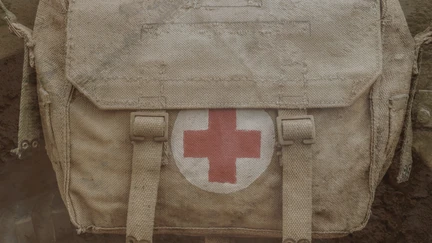Ngāi Māori i te Pakanga Tuatahi o te Ao - Māori in the First World War
Booklists and more about Māori and the First World War.

Discover their stories
The first Māori Victoria Cross Recipient
Second Lieutenant William Barnard Rhodes-Moorhouse (Ngāti Tama, Ngāti Ruanui) has the distinction of being not just the first Māori airman, but also the first British airman to receive the award of Victoria Cross for his bravery in World War I.
Read more about William Barnard Rhodes-Moorhouse on our Brave Soldiers page.
Websites
- Māori and the First World War — Te Ara
"When the First World War began many tribes answered the call, offering themselves for immediate service. In contrast to the South African War, the offer of a 500-strong Māori Contingent was accepted by the British government. During the war 2,500 Māori served overseas, a strong commitment from a total Māori population of 63,000." - Māori contingent in the First World War — Te Ara
"Many Māori soldiers had been at Gallipoli from the outset, having volunteered for the provincial infantry battalions. One was Wātene Moeke (who served with the Auckland Regiment as William Moeki), the first Māori casualty of the war, who was killed during the 25 April landings. Some Māori also served in the Australian Imperial Force, while a few enlisted with the British Army." - Māori in the New Zealand Expeditionary Force - NZHistory.net
"By the end of the war, 2227 Māori and 458 Pacific Islanders had served in what became known as the Maori (Pioneer) Battalion. Of these, 336 died on active service and 734 were wounded. Other Māori enlisted (and died) in other units." - Māori Contingent at Gallipoli (part of the article above)
"[...] One such man was Second Lieutenant Thomas (Hami) Grace of the Wellington Battalion."
"An old boy of Wellington College, Grace was a talented sportsman. He played rugby for the New Zealand Maoris teams that toured New Zealand in 1911 and Australia in 1913. A noted marksman, he was an effective sniper at Gallipoli. He was killed on 8 August as the Wellington Battalion seized the crucial heights of Chunuk Bair."
"[...] Te Rangi Hiroa recorded in his diary that the gallantry of Māori at Gallipoli had 'earned them the respect and admiration of the British troops'. He was awarded the Distinguished Service Order, and nine other members of the contingent received military awards." - Māori in the New Zealand Expeditionary Force - Pioneer Battalion (part of the article above)
"'Kua wehewehe matou' (We are separated) [...]
Eight officers, including Te Rangi Hīroa (Peter Buck), called for an inquiry. They felt the charges questioned the honour of all Māori. One of those accused, Captain Roger Dansey, had been witnessed leading a bayonet charge and 'personally disposing of three Turks'. The officers sensed that some mistake had been made. Godley ordered the three men home for 'unsatisfactory performance' and decided to split the contingent up among other platoons in the New Zealand infantry brigades. He said that his decision was based on the need to reinforce other units and to allow Māori to fight alongside their fellow countrymen."
More resources online
Discover more photos, videos and stories online here: Digital NZ: Māori and the First World War.